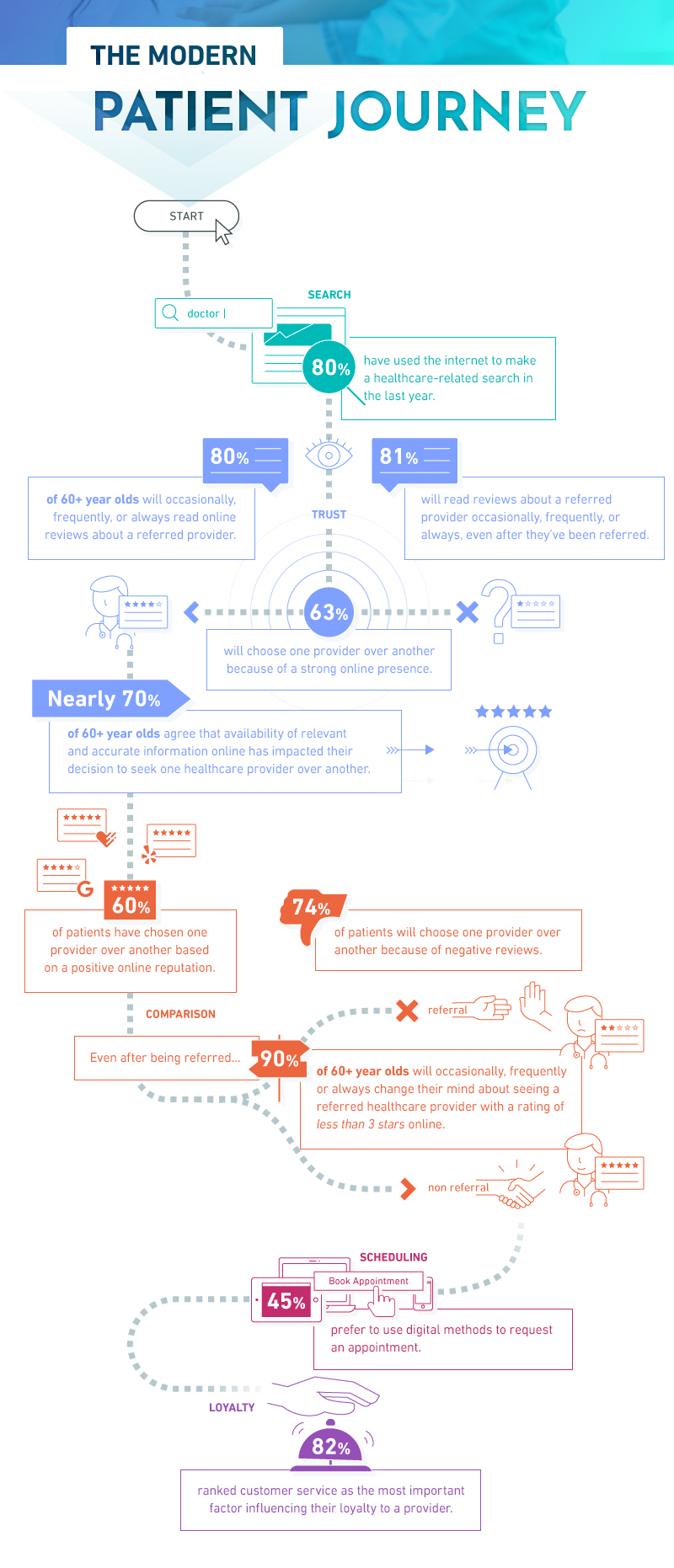It’s official: word-of-mouth referrals are no longer sacred in healthcare.
Eighty-one percent of patients revealed that they still conduct online research on providers they’ve been referred to, and 90 percent will choose another provider entirely if they don’t like what they see online. This shift in behavior, what some call the “Amazon effect,” marks a significant turning point in the healthcare industry.
The Amazon effect has altered the way consumers search for and select healthcare providers. When it comes to retail purchases, consumers follow a distinct journey: they conduct online research, comparison shop, read a number of consumer reviews, and make a purchase with a click. Convenience, “social proof,” and readily available information are key to the retail experience. Consumer expectations for healthcare are no different. In fact, 60 percent of people expect their digital experience in healthcare to mirror that of retail.
It’s critical that healthcare organizations deliver a digital experience that meets consumer standards in order to win patient trust and loyalty.
Doctor.com’s recent survey of more than 1,700 patients uncovers a new framework for the customer journey in healthcare—one that hinges on digital channels. Read on for five key ways to pave a digital path that exceeds patient expectations, leading them right to your organization’s door.

1. Understand that the patient journey starts online.
The healthcare journey begins long before a patient walks into the waiting room. In fact, 80 percent of survey respondents reported using the internet to make a healthcare-related search in the past year. Even those with a referral will do some online investigation before deciding to see a doctor (81%).
Prior to engaging your office, patients will develop an opinion about your practice or hospital. In fact, 90 percent will decide not to see you before even meeting you, based on your online reputation alone. This is essentially a “hidden” cause of referral leakage that can be surprisingly costly.
Bottom line: if you’re not proactively working to increase your online visibility and engage patients on their digital journey, you’re already behind.
2. Establish a strong online presence.
Patients are avid investigators when it comes to their own healthcare—they look for the availability of up-to-date, accurate and compelling information about their provider, as well as authentic patient reviews. In fact, nearly two-thirds of patients will choose another provider because of a stronger online presence.
And it’s not just millennials. Nearly 70 percent of people aged 60 and up will choose one provider over another because of a strong online presence.
Bottom line: No matter how strong the referral, patients will compare providers based on these factors. Leverage this trend to your advantage by adding rich content like photos, videos, detailed biographies, and philosophies of care to your online profiles. Think of every profile as an opportunity to reinforce your brand story and be sure you have technology in place to manage your provider data and online listings at scale.
3. Secure patient trust.
The modern consumer relies on online reputation to determine who to trust, and the healthcare consumer is no different. Nearly 60 percent of patients have chosen one provider over another based on a provider’s positive online reputation. In fact, 60 percent of patients would not book with a provider based on the quality of their reviews (i.e., reviews that seem inauthentic or sponsored).
High-quality care is just the starting point; it’s expected and part of a bigger picture. The stakes are higher than ever when it comes to successfully winning a patient over at every step of their customer journey—from the point of search up until they’re in your waiting room.
Bottom line: Be sure you have the tools and strategy in place to effectively monitor and manage your online reputation. Also, consider “going transparent” by publicly displaying patient satisfaction data from CAHPS surveys on your own website’s provider profile pages.
4. Successful acquisition relies on good customer experience.
When a patient has finally decided to choose you as their provider, they expect the rest of the journey to be as seamless as possible. Engaging your front office and booking an appointment should be pain-free, setting the tone for a good patient experience.
Sixty-one percent consider ease of appointment booking to be a major factor in granting 5 stars to a healthcare provider, and 42 percent of patients will actively choose a provider because of the ability to use online scheduling.
Eighty-six percent of patients consider good CX to be the most important factor in 5-star healthcare, assuming quality care was received.
Bottom line: Don’t lose patients in that critical “last mile.” Offer easy-to-use digital booking tools that are synonymous with good CX.
5. Use digital to secure loyalty.
Seventy percent of patients consider good patient communication and engagement, such as follow-up or annual check-up reminders, to be key to a 5-star experience. Eighty-two percent said a good customer experience is what keeps them returning as patients.
Bottom Line: Patients expect a lot from their healthcare provider, and with good reason. Maintain a healthy and lasting relationship through periodic patient communication, even after they’ve left your office.
By implementing these five strategies, you’ll be well on your way to future-proofing your success and ensuring that consumers become loyal patients and advocates of your organization.
Author Bio and Byline:
As CEO, Andrei guides strategy and oversees daily operations at Doctor.com, the leading customer experience platform purpose-built for the healthcare industry. He has helmed the company from inception and is committed to helping healthcare organizations deliver a better customer experience at every step of the patient journey.
Prior to founding Doctor.com, Andrei was a founding team member of KN Dimestore, a market research company acquired by Knowledge Networks in 2009 (now part of GfK, a $1.5 billion publicly traded German company) and an early employee of Game Trust, which was acquired by Real Networks (NASDAQ: RNWK) in 2007. He began his career developing web-based user experiences for Fortune 500 and Government clients.